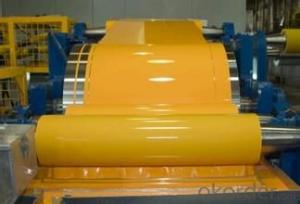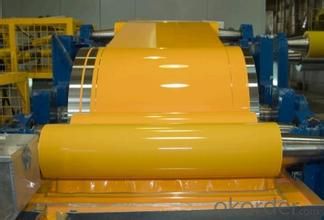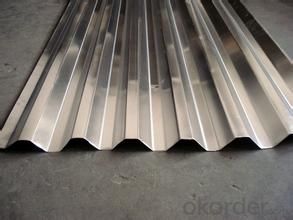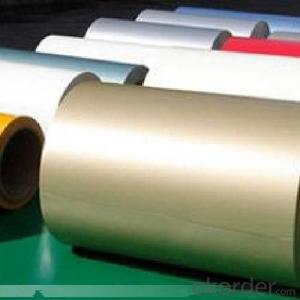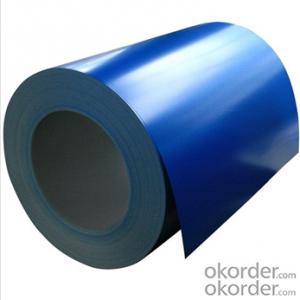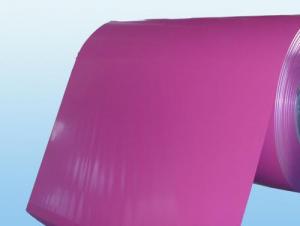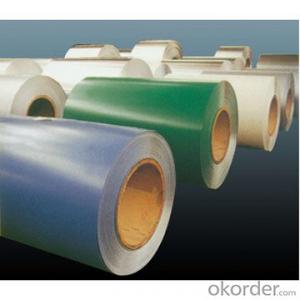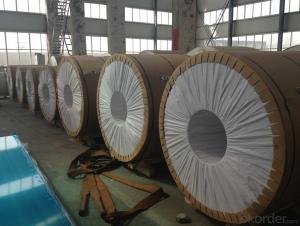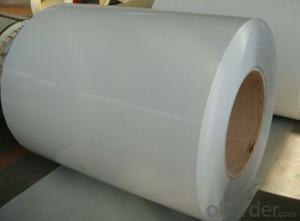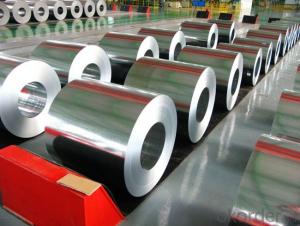Aluminum Coil 1100 Prepainted for Garage Door
- Loading Port:
- China Main Port
- Payment Terms:
- TT OR LC
- Min Order Qty:
- -
- Supply Capability:
- -
OKorder Service Pledge
OKorder Financial Service
You Might Also Like
Aluminium is a relatively soft, durable, lightweight, ductileand malleablemetalwith appearance ranging from silvery to dull gray, depending on the surfaceroughness. It is nonmagnetic and does not easily ignite. A fresh film ofaluminium serves as a good reflector (approximately 92%) of visible lightand an excellent reflector (as much as 98%) of medium and far infraredradiation. The yield strength of pure aluminium is 7–11 MPa,while aluminium alloys have yield strengths ranging from200 MPa to 600 MPa. Aluminium has about one-third the densityand stiffness of steel. It is easily machined,cast, drawn and extruded.
Aluminium alloys (or aluminum alloys; see spellingdifferences) are alloysin which aluminium(Al) is the predominant metal. The typical alloying elements are copper, magnesium,manganese,silicon,tin and zinc. There are twoprincipal classifications, namely casting alloys and wrought alloys, both of which are furthersubdivided into the categories heat-treatableand non-heat-treatable. About 85% of aluminium is used for wrought products,for example rolled plate, foils and extrusions.Cast aluminium alloys yield cost-effective products due to the low meltingpoint, although they generally have lower tensile strengthsthan wrought alloys. The most important cast aluminium alloy system is Al–Si,where the high levels of silicon (4.0–13%) contribute to give good castingcharacteristics. Aluminium alloys are widely used in engineering structures andcomponents where light weight or corrosion resistance is required
Specification:
Alloy: AA1050, 1060, 1100,AA3003, 3005, 3015, 5052, 5754, 5083,8011, etc
Temper:H14/16/18/22/24/32, HO etc.
Thickness:0.2mm—100mm
Width: 100mm—2300mm (Can be slitted)
InnerDiameter: 508MM
Coil Weight:500kg-3000kg(Max.)
Application:Foil stock, Circles, Roofing, Can stock, Marine plate,Anti-slipery purpose in vehicles, packing and appliance.
Features:
1. Excellent quality of products
2. Quick delivery
3. Best service to clients
4. BV,SGS avalible
5. No buckle o waveness
6. Tension leveling
7. Certificate of Origin
8. Form A,E
Packaging Detail:
Carton ,Woodenpallet with plastic protection packing ,standard seaworthy packing or as yourrequest.
ProductionCapacity:
AnnualProduction capacity of 600,000 tons.
Products areexported to United States, Canada, U.A.E, Brazil, Mexico,Thailand, Vietnam,Nigeria etc, over 100 countries andregions all over the world.
Production Line:
CNBM aluminumproduction base is comprised of 18 aluminumannealers, 10 coil and foilmills, 4 continuous production lines, 2hot rolling production line and 3prepainted lines.
FAQ:
1. What is the form of payment?
Normally 30% TT, L/C
2. Type of quotation?
FOB, CFR, CIF
3. Port of loading?
Shanghai port
4. Delivery time?
30 day after client’s deposit
- Q: Can aluminum coils be used for gutter systems?
- Yes, aluminum coils can be used for gutter systems. Aluminum is a popular material for gutters due to its lightweight nature, durability, and resistance to rust and corrosion. Aluminum coils are often used to form seamless gutters, which offer advantages such as fewer leaks and a more aesthetically pleasing appearance. Additionally, aluminum gutters are easy to maintain and can be painted to match the exterior of a building. Overall, aluminum coils are a suitable and commonly used choice for gutter systems.
- Q: Can aluminum coils be used in the production of aluminum foam panels?
- Yes, aluminum coils can be used in the production of aluminum foam panels. Aluminum foam panels are typically made by injecting a foaming agent into molten aluminum, which causes the aluminum to expand and form a foam structure. This foam is then solidified and can be further processed into panels. Aluminum coils are commonly used in various industries, including construction, automotive, and packaging, due to their excellent properties such as lightweight, high strength, corrosion resistance, and thermal conductivity. These properties make aluminum coils suitable for use in the production of aluminum foam panels. To produce aluminum foam panels, the aluminum coil can be processed into a flat sheet or strip, which is then cut into the desired size and shape for the panels. The flat aluminum sheet or strip can be easily handled and processed during the foam production process. The foam-forming agent can be introduced into the molten aluminum, and the expanding aluminum foam can be poured onto the flat sheet or strip to form the panels. The use of aluminum coils in the production of aluminum foam panels allows for efficient manufacturing processes, as the coils can be easily rolled, shaped, and cut to meet specific design requirements. Additionally, the use of aluminum coils ensures that the foam panels maintain the desirable properties of aluminum, such as strength, durability, and light weight. Overall, aluminum coils can be effectively used in the production of aluminum foam panels, providing a versatile and cost-effective solution for various applications, including insulation, sound absorption, and structural components.
- Q: What are the different coil coating technologies used for aluminum coils?
- There are several different coil coating technologies used for aluminum coils, each offering distinct advantages and suitability for specific applications. 1. Coil Coating with Liquid Coatings: This traditional method involves the application of liquid coatings onto aluminum coils. The coatings can be solvent-based or water-based and are typically applied using roll coating or spray coating techniques. Liquid coatings offer a wide range of color options, excellent chemical resistance, and good adhesion to the substrate. However, they may require longer drying times and can result in uneven coating thicknesses. 2. Coil Coating with Powder Coatings: Powder coatings are electrostatically applied onto aluminum coils in a dry powder form. The coated coils are then heated to melt and cure the powder, forming a tough and durable finish. Powder coatings offer excellent corrosion resistance, UV resistance, and impact resistance. They also have a high deposition efficiency, resulting in minimal waste. However, powder coatings may have limited color options compared to liquid coatings. 3. Coil Coating with PVDF (Polyvinylidene Fluoride) Coatings: PVDF coatings are a type of liquid coating that offers exceptional weatherability and durability. These coatings are known for their excellent resistance to fading, chalking, and chemical exposure. PVDF coatings are commonly used in architectural applications where long-term performance and color retention are crucial. They can be applied using roll coating or spray coating methods. 4. Coil Coating with Polyester Coatings: Polyester coatings are widely used in various industries due to their cost-effectiveness and versatility. These coatings offer good color retention, flexibility, and resistance to abrasion. Polyester coatings are available in a wide range of colors and textures, making them suitable for decorative applications. They can be applied using both liquid and powder coating methods. 5. Coil Coating with Polyurethane Coatings: Polyurethane coatings provide excellent adhesion, flexibility, and impact resistance. These coatings are commonly used in demanding applications where durability and resistance to harsh environments are required. Polyurethane coatings offer good color retention and can be applied using liquid coating techniques. In summary, the different coil coating technologies used for aluminum coils include liquid coatings, powder coatings, PVDF coatings, polyester coatings, and polyurethane coatings. The choice of coating technology depends on factors such as the desired performance characteristics, application requirements, and cost considerations.
- Q: Can aluminum coils be welded or joined together?
- Aluminum coils have the capability to be welded or connected together. Welding is a widely used approach for joining aluminum coils, especially in industries like automotive, aerospace, and construction. Multiple welding techniques, including TIG (tungsten inert gas) welding, MIG (metal inert gas) welding, and spot welding, can be utilized. These techniques enable the formation of robust and resilient connections between aluminum coils. Moreover, depending on the specific application needs, alternative joining methods like adhesive bonding or mechanical fastening can also be employed. By utilizing the appropriate welding or joining technique, aluminum coils can be effectively and securely joined together.
- Q: How are aluminum coils used in the aerospace industry?
- Aluminum coils are widely used in the aerospace industry for various applications such as aircraft structures, wings, fuselages, and engine components. The high strength-to-weight ratio of aluminum makes it an ideal material choice for these applications, as it helps reduce the overall weight of the aircraft while maintaining structural integrity. Additionally, aluminum coils can be easily formed, welded, and machined, allowing for efficient manufacturing processes.
- Q: Can a rolling machine be utilized to transform aluminum coils into flat sheets?
- <p>Yes, you can use a rolling machine to roll aluminum coils into sheets. Rolling machines are specifically designed to apply pressure and reduce the thickness of metal coils, such as aluminum, into thinner, flatter sheets. The process involves passing the aluminum coil through the rolling mill, where it is compressed between rollers. This process can be repeated to achieve the desired thickness and flatness of the aluminum sheet. It's important to ensure the rolling machine is suitable for aluminum and that the appropriate settings are used to avoid damaging the material or the machine.</p>
- Q: How much is one ton of aluminum coil?
- The price of aluminum sheet is calculated according to the price of aluminum ingot + processing fee (aluminum plate state), and the specific price is also different according to the size and size of aluminum sheet.If you have any questions, please ask. I hope to help you.
- Q: What are the weight and thickness options for aluminum coils?
- The weight and thickness of aluminum coils can differ based on specific requirements and applications. There is a wide range of weight and thickness options available for aluminum coils to meet the needs of different industries. In terms of weight, aluminum coils are offered in various choices including light gauge, standard gauge, and heavy gauge. Light gauge aluminum coils generally have a thickness ranging from 0.006 to 0.025 inches and are commonly utilized in industries that require lightweight materials like packaging, electronics, and automotive components. Standard gauge aluminum coils are slightly thicker, ranging from 0.026 to 0.063 inches, and are often used in construction, roofing, and transportation applications. Heavy gauge aluminum coils are the thickest option, typically measuring 0.064 inches and above, and are frequently employed in heavy-duty applications such as aerospace, marine, and industrial equipment manufacturing. As for thickness, aluminum coils are available in various options as well. The thickness is usually measured in inches or millimeters, and the range can vary from as thin as 0.006 inches (0.15 mm) to as thick as 0.25 inches (6.35 mm) or even higher for specific applications. The suitable thickness of the aluminum coil depends on the intended use and the desired level of structural strength or flexibility required. It is important to note that these weight and thickness options may differ depending on the manufacturer and the specific aluminum alloy utilized. It is always advisable to consult with the manufacturer or supplier to determine the most appropriate weight and thickness options for your specific application.
- Q: This question asks about the distinctions among various grades of aluminum coils, likely referring to their properties and uses.
- <p>Aluminum coils are differentiated by grades based on their alloy composition, thickness, and specific applications. Common grades include 1000 series (99% pure aluminum, soft and malleable), 3000 series (aluminum-manganese alloys, good for cooking utensils), 5000 series (aluminum-magnesium alloys, used in marine applications), and 6000 series (aluminum-magnesium-silicate alloys, known for strength and used in construction). Each grade has distinct properties such as strength, formability, and corrosion resistance, which determine their suitability for different industries and applications.</p>
Send your message to us
Aluminum Coil 1100 Prepainted for Garage Door
- Loading Port:
- China Main Port
- Payment Terms:
- TT OR LC
- Min Order Qty:
- -
- Supply Capability:
- -
OKorder Service Pledge
OKorder Financial Service
Similar products
Hot products
Hot Searches
Related keywords
